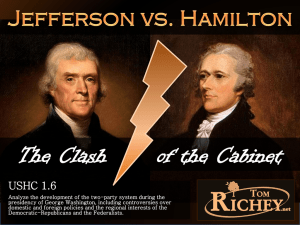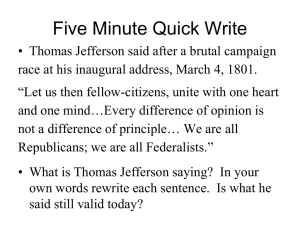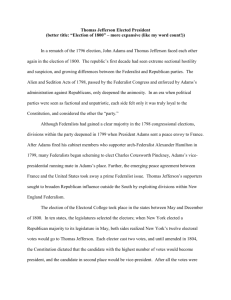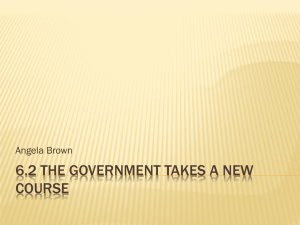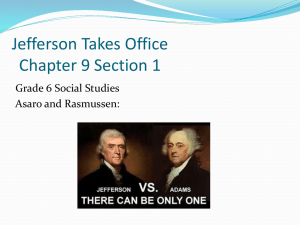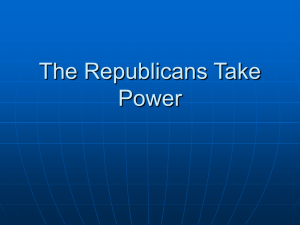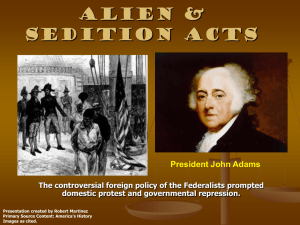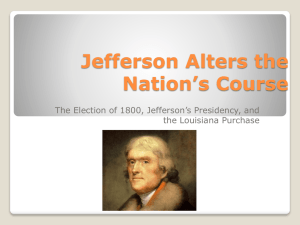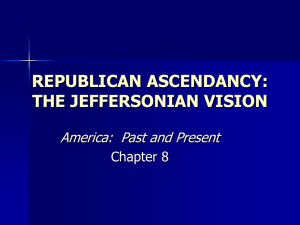Power Point
advertisement
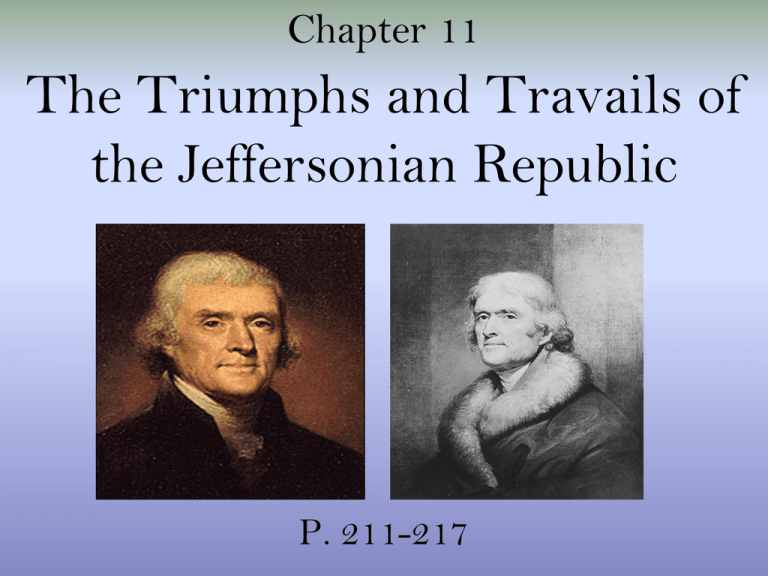
Chapter 11 The Triumphs and Travails of the Jeffersonian Republic P. 211-217 • The Jeffersonian Democratic Republicans presented themselves as: –Strict constructionists (literal interpretation of the Constitution). –Protectors of agrarian purity. –Believers of political and economic liberty. –Strong supporters of states’ rights. Federalist and Republican Mudslingers In the election of 1800, the Federalists had a host of enemies stemming from the Alien & Sedition Acts. But the Federalists had likely been most damaged by John Adams’ not declaring war against France. Federalist and Democratic Republican Mudslingers John Adams became known as “the Father of the American Navy.” The Federalists had raised a bunch of taxes and built a good navy, yet ultimately hadn’t given good reason to justify such spending (since war with France never happened). This spending ultimately made them seem a bit fraudulent in their intentions as once again public debt swelled. Federalists also launched personal attacks on Jefferson, saying that he had robbed a widow and her children of a trust fund, fathered numerous children with his slaves (which turned out to be true), called him an atheist (he was a Deist), and used other inflammatory remarks to attack his character. The Jeffersonian “Revolution of 1800” Still, Thomas Jefferson won the election of 1800 by a majority of 73 electoral votes to 65, and even though Adams got more popular votes, Jefferson got New York. But, even though Jefferson triumphed, in a technicality he and Aaron Burr tied for presidency. The vote, according to the Constitution, would now go to the Federalist-dominated House of Representatives. Hateful of Jefferson, many wanted to vote for Burr, and the vote was deadlocked for months until Alexander Hamilton and John Adams persuaded a few House members to change their votes, knowing that if the House voted for Burr, the public outcry would doom the Federalist Party. Finally, a few changed their minds, and Jefferson was elected to the presidency. The Jeffersonian “Revolution of 1800” The “Revolution of 1800”: (1) Was especially remarkable because there was a peaceful transfer of power; Federalists stepped down from office after Jefferson won and did so peacefully, though not necessarily happily. (2) The Federalists deserve much credit for “following the rules” and obeying the laws of the Constitution. Because they did so, a precedent was set, and there has never been a violent transition of power in the United States. Responsibility Breeds Moderation On March 4, 1801, Thomas Jefferson was inaugurated president in the new capital of Washington D.C. In his address, he declared that all Americans were Federalists and that all were Republicans, implying that Americans were a mixture. He also pledged “honest friendship with all nations, entangling alliances with none.” Responsibility Breeds Moderation Jefferson was simple and frugal for being a wealthy planter. He did not seat guests in regard to rank during his dinners, for example, and he also was very unconventional for the time (ie. wearing sloppy attire, and even greeting White House guests in his robe and slippers!) He also started the precedent of sending messages to Congress to be read by a clerk, which wasn’t broken until Woodrow Wilson in 1913. There were two Thomas Jeffersons: the scholarly private citizen who philosophized in his study, and the harassed public official who discovered that his bookish theories often worked out MUCH differently in practical politics. Responsibility Breeds Moderation Much to his credit, Jefferson dismissed few Federalist officials. He didn’t want to “rock the boat” too badly from the Federalists, but JDRs who wanted the seats loudly complained. Jefferson had to rely on his casual charm because his party was so disunited still. Not granting enough jobs to JDRs didn’t help, but he wanted to prove that he was a reasonable bipartisan ruler.

